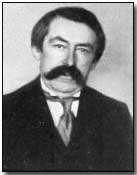Who's Who - Aristide Briand
 Aristide Briand (1862-1932) served six
terms in all as French Prime Minister - 1909-11, 1913, 1915-17, 1921-22,
1925-26, 1929 - and was France's longest serving First World War premier,
succeeding Rene Viviani
in October 1915.
Aristide Briand (1862-1932) served six
terms in all as French Prime Minister - 1909-11, 1913, 1915-17, 1921-22,
1925-26, 1929 - and was France's longest serving First World War premier,
succeeding Rene Viviani
in October 1915.
Born in Nantes on 28 March 1862, Briand studied as a law student during which time he developed and honed his political instincts, which were socialist. He published left-wing articles for numerous newspapers (including Petite Republique and Le Peuple) before co-founding L'Humanite in 1904 with Viviani and the later Socialist Party leader, Jean Jaures.
Briand entered into Georges Clemenceau's coalition government in 1906 as minister for public instruction and worship, a post he held until his elevation to Prime Minister in 1909; his decision to accept office led to his expulsion from the Socialist Party, which prevented its members from playing a role in any 'bourgeois' government (explaining why Jaures, despite his popularity, never accepted ministerial office).
An anti-cleric, Briand used his first ministry to complete the separation between the French church and state.
Appointed Prime Minister in July 1909 Briand caused outrage among his former socialist colleagues by breaking up a railway strike by the simple means of conscripting its leaders into the armed forces. Briand's views with regard to the military were decidedly unorthodox for a socialist; again much to the dismay of former colleagues such as Jaures he came out in support of an extension of compulsory military service.
With the German declaration of war with France in August 1914 Briand, by then out of office, re-entered Viviani's government as Justice Minister; he remained an influential member of the cabinet, and his support for an extension of the French war effort to the Balkans - he was a pronounced 'easterner' - was taken seriously by Viviani, although the latter was singularly unsuccessful in persuading his Commander in Chief, Joseph Joffre, to divert any resources from the Western Front.
Among other factors, Viviani's inability to demonstrate control over Joffre and his fellow commanders led to his resignation in October 1915. The French President, Raymond Poincare, appointed Briand (a long-time ally) Prime Minister in his stead.
Viviani found Joffre as difficult to manage as his predecessor, but ultimately resolved the situation by tactfully removing Joffre from command in late 1916, taking care to ensure that Joffre was made a Marshal of France on the same day he was dismissed.
Joffre's failure to anticipate the German offensive at Verdun made the decision to appoint a new Commander in Chief acceptable to the French Chamber, although the events at Verdun had begun the slide of Briand's government.
By now coming under increasing political fire - his replacement of Joffre with the belligerently aggressive Robert Nivelle bought him little respite - Briand had to deal with sniping from Clemenceau (temporarily himself out of office) who objected to Briand's 'defeatist' decision not to actively suppress French pacifists, and with his refusal to dismiss Louis Malvy, his interior minister, for the latter's belief in negotiating peace with Germany.
Nivelle's disastrous Aisne offensive (the Nivelle Offensive) inevitably failed, and the resignation of war minister General Hubert Lyautey over the matter in March 1917 (along with many others he foresaw the failure of the offensive) brought Briand down with him. Clemenceau replaced Briand as premier.
Returned to office after the war for numerous terms as prime minister, Briand continued to serve as Foreign Minister from 1926 until his death in 1932.
After the war Briand championed the newly-created League of Nations and established a reputation as an international pacifist. Determined to foster Franco-German reconciliation Briand was, in 1926, a co-recipient with Gustav Stresemann of the Nobel Peace Prize.
Aristide Briand died in Paris on 7 March 1932 at the age of 69.
Click here to read Aristide Briand's statement regarding a German policy of enforced deportations from German-occupied Lille.
A "gutzer" was slang for a stroke of bad luck.
- Did you know?
